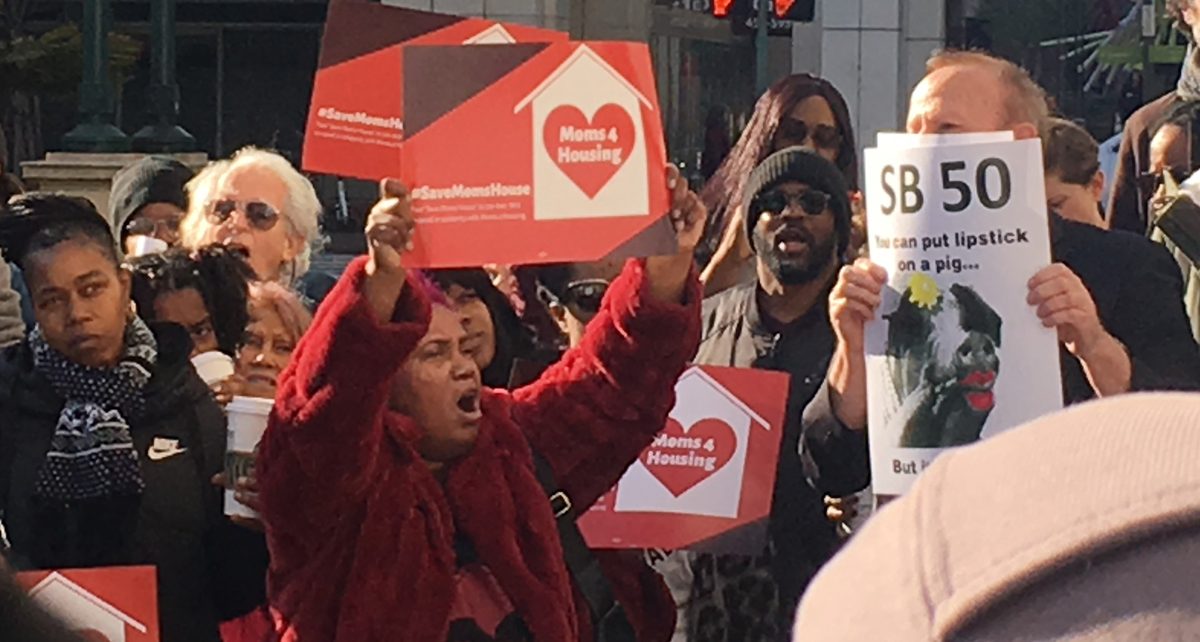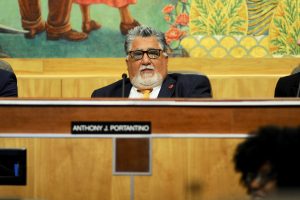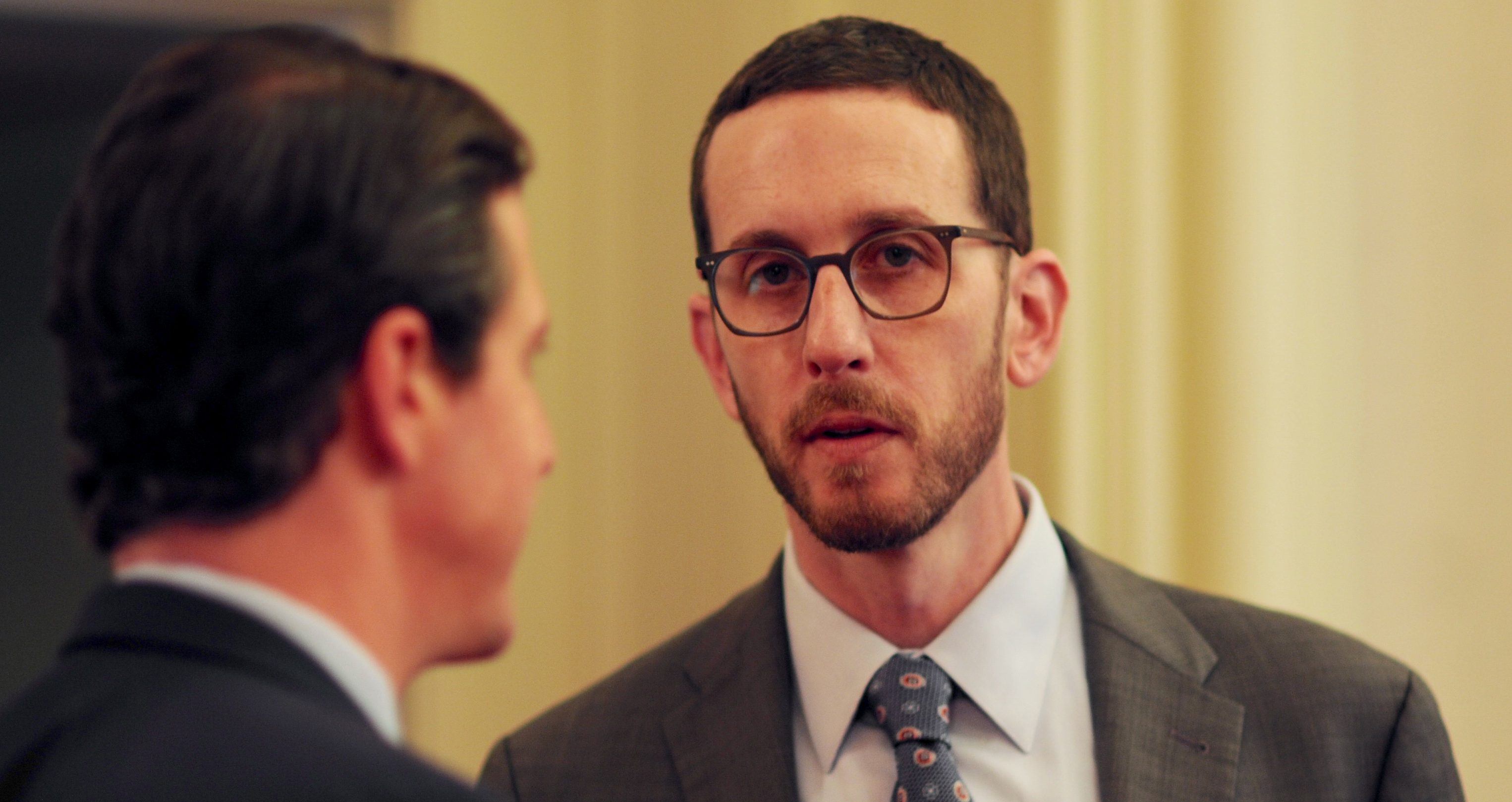
Protesters disrupt Senator Wiener's SB 50 kicking off speech in Oakland. (KTVU)
High-Density Housing Bill SB 50 Returns to the California Legislature Amid Protests
Supporters hope the third version of SB 50 will pass while opponents say he bill still goes too far
By Evan Symon, January 8, 2020 2:30 am
SB 50, the bill that would alter local zoning laws to allow for more higher density residential buildings and allow the building of multiple-family buildings in areas currently zoned for single families, has returned to the Senate for the third time since 2018 following past delays and postponements.
A third try at passage

Authored by Assemblyman Scott Wiener (D-San Francisco), SB 50 has proven to be controversial. Many cities, especially those with historical districts or a long history of single family housing, are against building new tall, high-density buildings. Many cities have also been disappointed with the bill not allowing cities much control on where new larger developments could take place.
On Monday, SB 50 was resubmitted with changes including giving cities greater control over where new higher density projects could be built as long as the density meets the required growth. Cities would have two years to come up with such a plan for developments.
“They want to be able to have some flexibility to increase the density in their community in their own way,” noted Assemblyman Wiener.
Low-income people living near new low-income developments would also have priority in getting new apartments under the changes.
Protests in Oakland
While the changes were designed to accommodate cities who disagreed with SB 50 in the past, protest groups against the updated bill banded together virtually overnight.
On Tuesday Assemblyman Wiener formally announced the new changes at Oakland City Hall, only to be met by the Moms 4 Housing group jeering him. The group made headlines by squatting in an empty Oakland house when rents became too high.
TV and radio crews could barely pick up Senator Wiener’s speech on SB 50 while Moms 4 Housing members shouted chants of “Hey hey, ho ho, luxury housing has got to go,” and “California hates the homeless,” and “Where’s the affordable housing?”
Wiener did manage to talk over the crowd, saying “We have a terrible housing crisis here in California, and we see the effects every day. People are being pushed into poverty, and people are being pushed out of California, and people are being pushed into multi-hour commutes,” Wiener said over the shouts of protesters.
“They’re mad about all these luxury condos and apartments going up,” said San Jose housing activist Luis Martinez. “Southern California is too.”
“They’re mad at allowances being made for developers, such as if a developer puts in 10% or 15% low-income units then they are allowed to add in even more high priced units. They’re mad at being forced out of neighborhoods they love, especially if these were a historically ethnic neighborhood and now they’re not.”
“And they really hate market-rate places, because there is no way most people can afford those in the East Bay.”
Opposition to SB 50 continues

Republicans and many Democrats have remained in opposition to this new version of SB 50. Senator Anthony Portantino (D-La Canada Flintridge), who was the Democratic leader behind the bills postponement last year, has remained skeptical of SB 50 as he is concerned that high-price market-rate housing would trump low-income housing.
“This bill doesn’t build affordable housing,” said Senator Portantino about last years version. “I prefer to actually fund affordable housing.”
Other lawmakers have avoided the issue because of its polarization. In the middle of all the fights that occurred over SB 50 between state officials, local officials, neighborhood activists, and developers last year, Governor Gavin Newsom didn’t say if he was for or against SB 50, preferring to back other housing measures instead.
Infrastructure issues
And this year SB 50 may face a new threat to its passage: infrastructure.
“This has always been a problem,” expressed former city planner Henry Mueller. “A lot of California cities can’t take much more strain. If you build, say, a new 20 unit complex in an area designed for single-family homes, it can be a disaster.”
“Do you have underground parking? If not, that’s a lot of street parking, even if you live right near a metro or bus station. Or street width – you can’t really make them wider in many places, so now traffic goes up. Both auto and foot. That also means more accidents and more noise.”
“Then there is a greater water need, a greater sewage need, a greater electricity need. And, again, some places aren’t meant to handle a bigger load. You also knock down green space for this, with along with more cars, creates more pollution.”
“It’s a giant mistake to just automatically approve places before any studies are done to make sure a big strain isn’t put on them. Cities aren’t saying no to this because they don’t want to house more people – they honestly do. Or at least cities I’ve kept in contact do.”
“No, this is one of the main reasons. You can’t just plop big apartment complexes down and assume everything will run the same. This isn’t Sim City. If you add in a huge building, that means more stress on schools, hospitals, police, fire – everything.”
“People like Wiener only see a single problem like the housing crisis and just expect putting more people in larger housing developments will work, but he ignores the burdens it puts on cities.”
An end of the month deadline
Large cities such as San Francisco have also come against SB 50, as new developments would only further raise prices and property values due to laws giving developers breaks for allowing a minimum amount of low-income housing. Smaller cities and towns have infrastructure issues, as well as density and over-burdening of resource concerns.
SB 50, after less than a few days back as an active bill, is already facing vocal and widespread opposition both in Sacramento and around the state. Debate over the new SB 50 is expected to continue until the Senate passage deadline at the end of the month.
- Bill to Require Law Enforcement Disclosure if AI Was Used To Help Write Reports - August 7, 2025
- Gov. Newsom Files FOIA Request To ‘Expose True Cost’ Of L.A. Federal Troop Deployment for Anti-ICE Riots - August 6, 2025
- California Redistricting: How Newsom’s Plan Will Demolish Hard Fought GOP Gains - August 6, 2025





No wonder Bloomberg sees California as a blueprint for the nation.
Going by previous construction plans passing through numerous approval of bureaucracy committees, it will take years to even get a spade into the ground. Investors will not fall for this, knowing they will not control the rent, the state reigns supreme.
Stop letting the illegals in. The “undocumented” people who don’t leave for example after a season of farm labor are adding to the housing and financial crisis. We need to take care of our own first. The homeless, impoverished, veterans, underemployed. Then we can talk about letting in more undocumented migrants and “asylum seekers.” There are a lot of so-called asylum seekers who aren’t really facing a crisis in their home countries. California govt. has gone rogue and is in the process of turning us into a third world country.